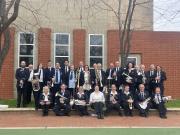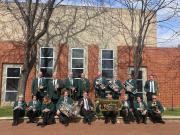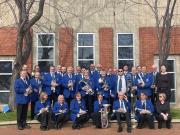Geoffrey "Chip" Magin
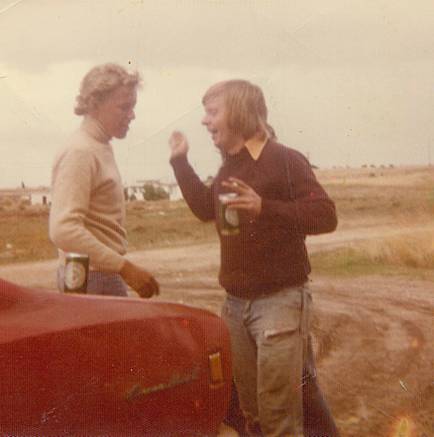
Above: Chip polishing up the finer points during competition preparation with Drum major Phil Benger.
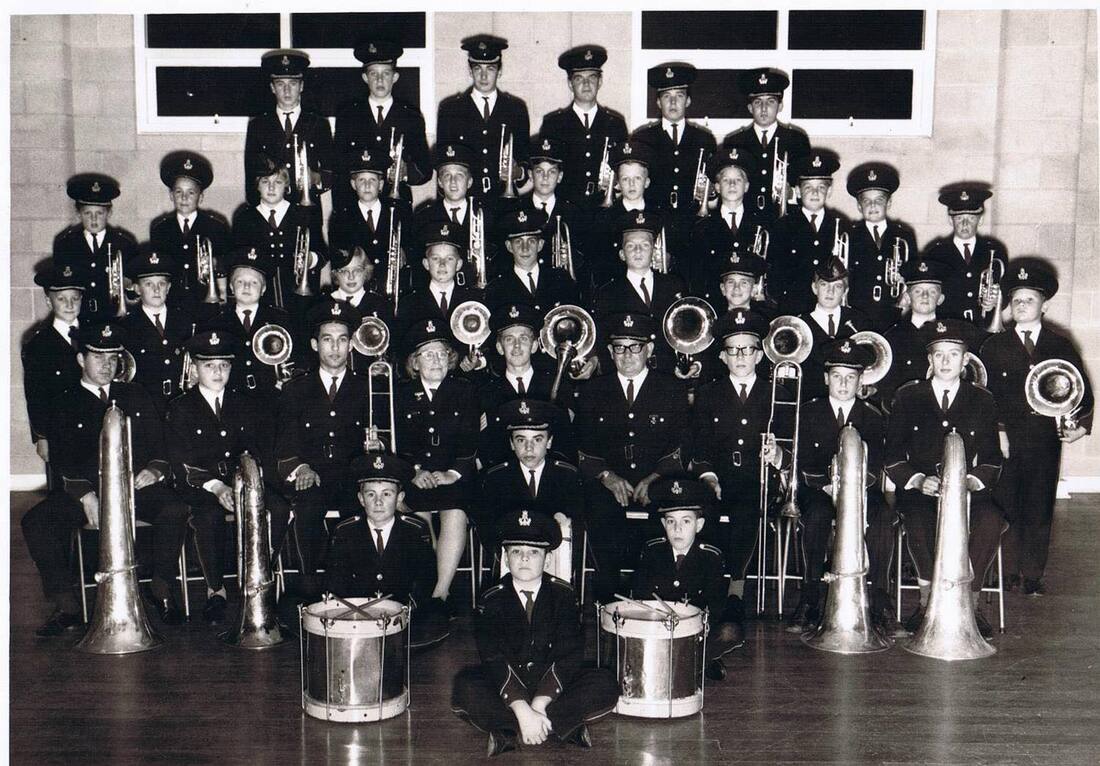
Above: Klemzig Junior Brass Band with founding conductor Jack Mitchell and wife trombonist and teaching wife Nell in 1966
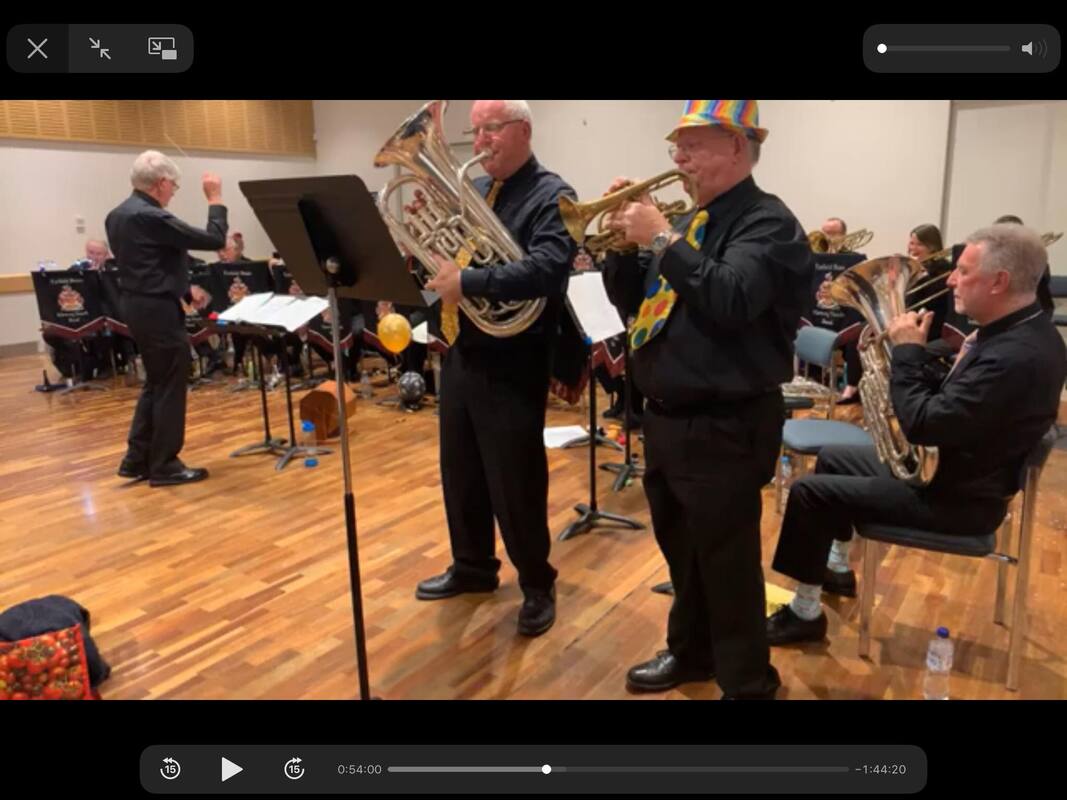
Above: Softly as I leave You .... a duet with talented brother Mikey in the Celebration of Life concert for Jeannie (Granny) Magin.
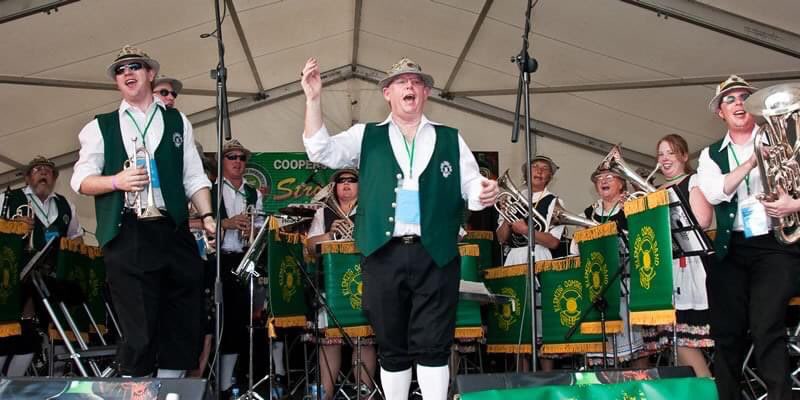
Above: Yodelling at the Schitzenface with the world famous Klemzig Oompah Band.
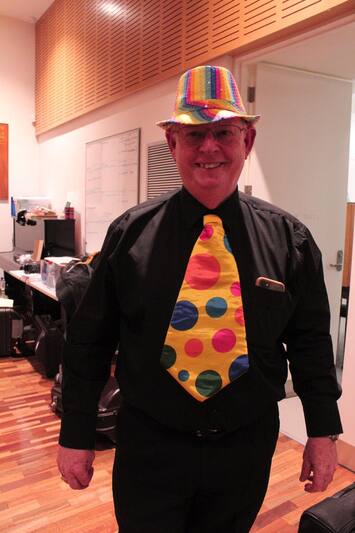
Above: Chip colourfully attired for the Celebration of Life concert in honour of Jeannie (Granny) Magin.
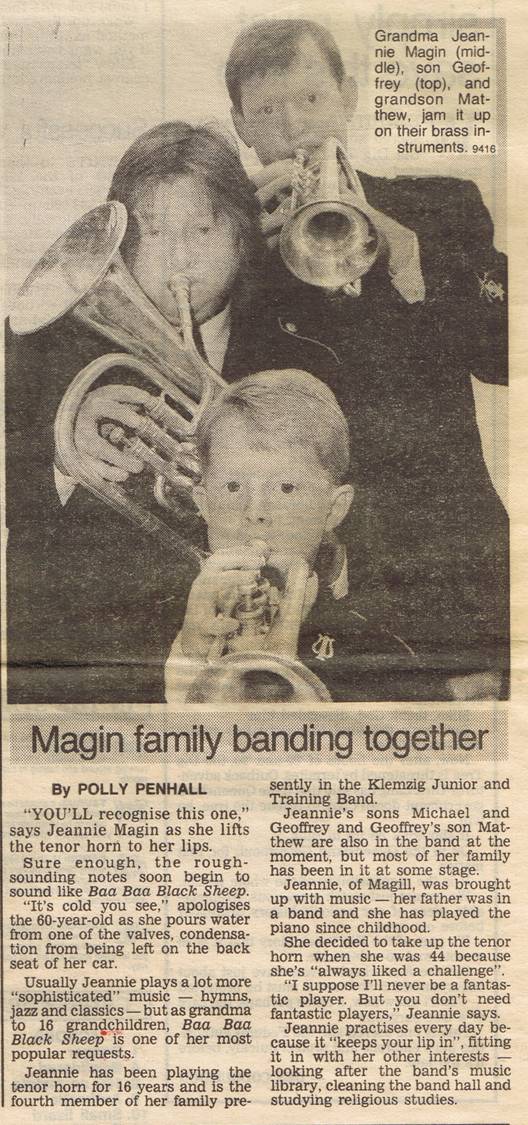
Above: Article extracted from The Standard local newspaper circa 1990.
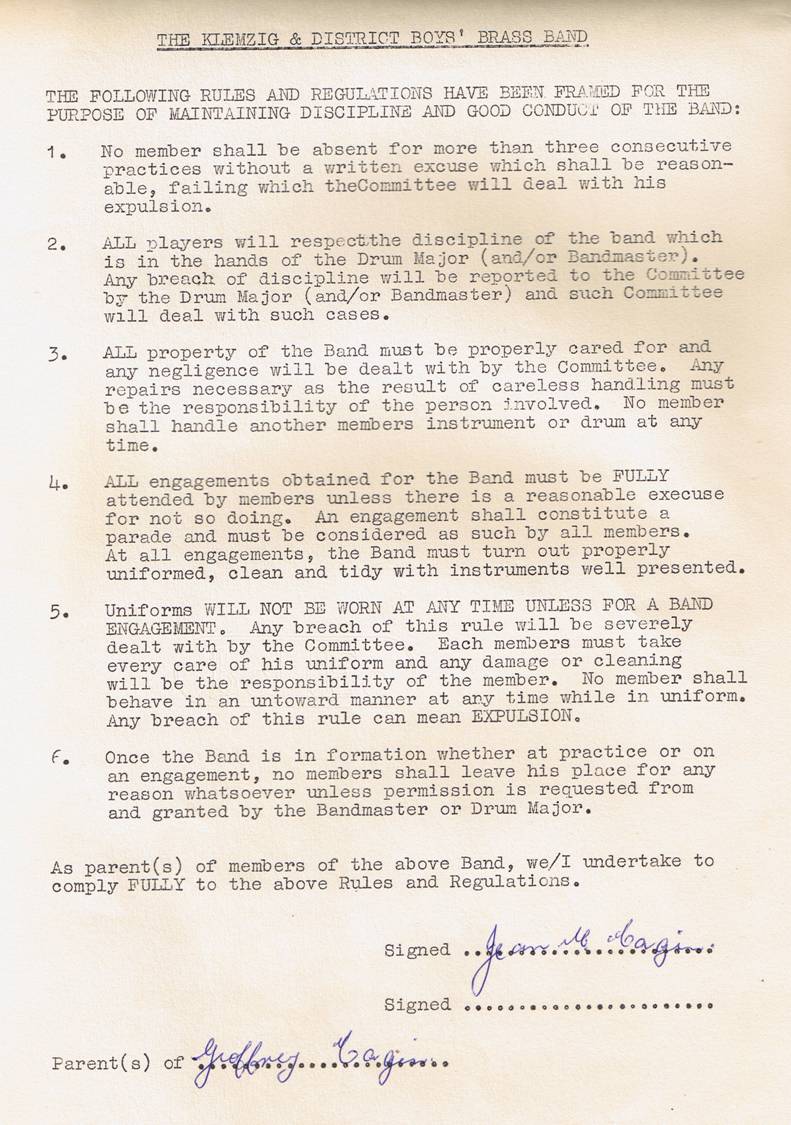
Above: Rules and regulations when joining Klemzig Boys band in 1964
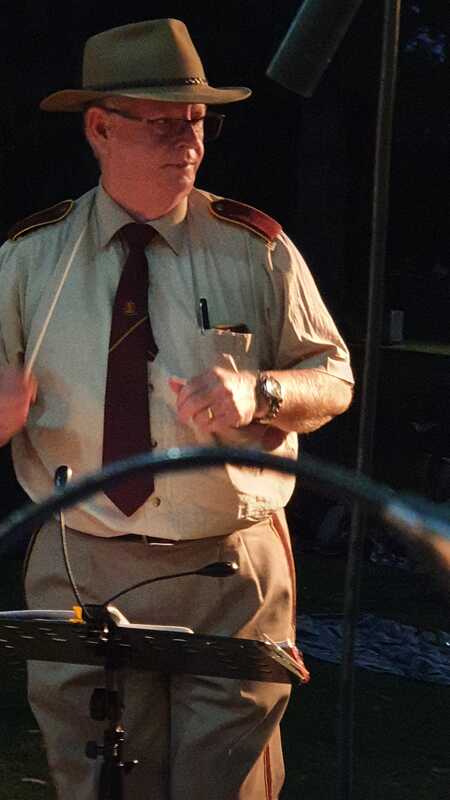
Above: Celebration of Christmas and Carols night in the par in Stepney, December 2022.
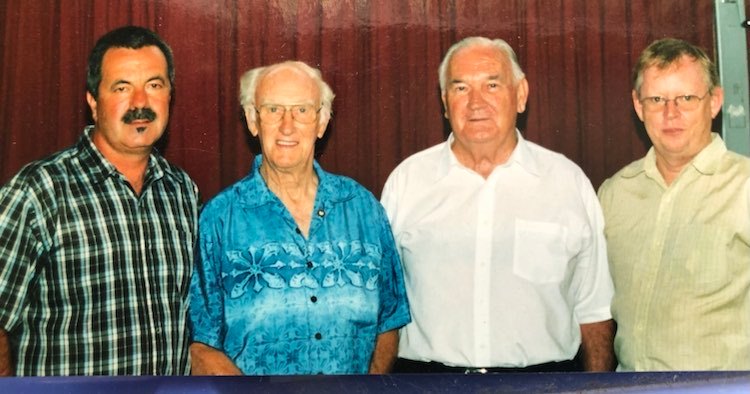
Above: Current and past MDs for Salisbury and Enfield Bands.
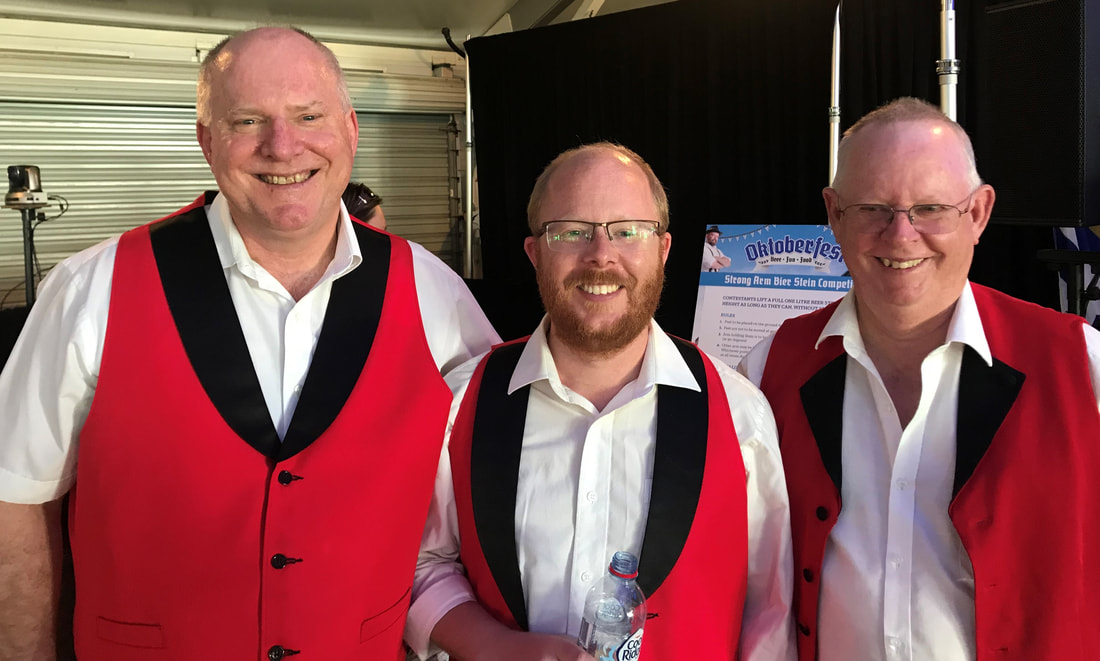
Above: The Magin Boys, Mikey, Matthew and Chip at the Darwin Oktoberfest.
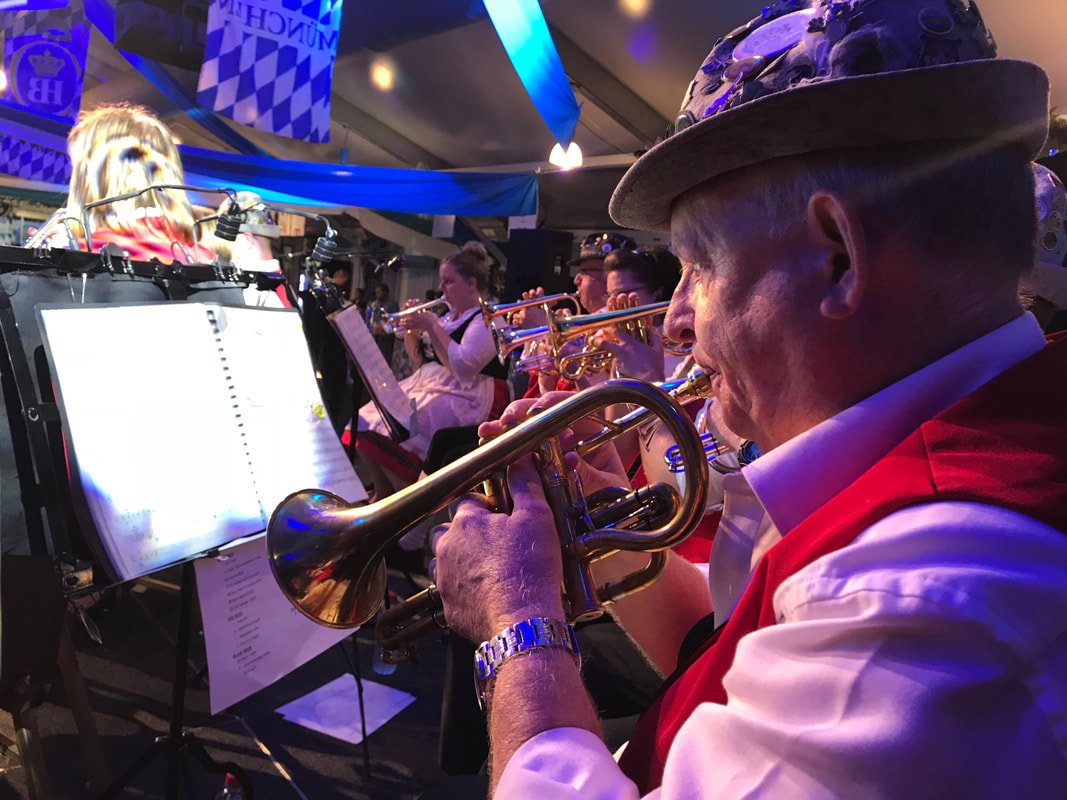
Above: Contemporary Chip in Oompah mode.
Introduction:
Sharing comes naturally to Geoffrey “Chip” Magin.
He is most definitely a product of his upbringing; I never knew his dad but his mum Jean was an inspiration to all who crossed her path. She raised a son (and his seven siblings) who is a giver, a do-er, a carer and a “get it done despite having obstacles to overcome” type of bloke!
Chip and I were born in the same year and in a sense are each other’s opposite numbers at Salisbury and Enfield, we both returned to where it all started for us and are giving back to our mothership ensembles.
As the current cohort of 60 something year olds get closer to their use-by date it is interesting to ponder over how the future of banding and society as a whole will fair without the guidance of the Geoffrey Magins of this world. I am a naturally optimistic person but a sense of reality compels me to draw the conclusion that when the “Cottonwool Kids” are left to their own devices we may see the end of brass banding as we know it.
At this point I feel a rant coming on so let’s move on to the banding story of Chip Magin, a fine fellow muso, family man, fearless flyer and faithful friend to many.
Geoff Meikle
Geoffrey “Chip” Magin
Interview Transcript, 7 September 2022
Geoffrey Meikle; “I’m here with Geoffrey Chip Magin, my opposite number at the Enfield Band. Chip, we were born in the same year and have the same initials. You’ve already filled out the biographical questionnaire but we’re here today to fill in some extra bits which we both felt were worth following up on. These include our feelings about banding and how it’s affected our lives. It’s particularly salient at the moment because we’ve just come off the back of the State Band Contest.
Geoffrey …. It’s not the same as it used to be!”
Geoffrey “Chip” Magin; “No, it’s not the same as it used to be. It’s different and difficult sometimes. We had four new players who had never even been in a competition playing with us. Quite amazing really. It was up at the Show Hall (Tanunda Show Hall) and for we experienced people, it was okay, but for those who had never played on that stage before, it makes a completely different sound.”
GM; “What were the rehearsals like leading up to the contest?”
Chip; “Well we’ve got a pretty good team who are very supportive of each other, there’s quite a large variety of skills and abilities. It was nice to see those who have more experience help and guide those who are still learning.”
GM; “You still seem to have a solid core of loyal players. How many did you have on stage?”
Chip; “Oh probably around twenty …. not many, we were a few short, especially on percussion.”
GM; “Like you and I have said before, it’s not the same as it used to be. One of the notable things about the contest was that there were players playing with more than one band and that seems to be what we have to do to make it work …... but at least we had something going!”
Chip; “Back twenty years ago we used to have to cull people because we had too many …. We did have a couple of extra players on the day, a solo cornet and a rep. They are both Tanunda registered players but are long term Enfield as well. We only had those players because they are long term Enfield players who rehearse with us regularly.”
GM; Those rules have changed. We’ve got a small contingent of Para Hills players who’ve been playing with us for three or four years now. We don’t focus particularly on competitions, if you did then you’d only be playing every three or four years because of the infrequency of competitions. We focus mainly on the entertainment stuff, however one of the things that we were pleased about was that we had twenty-eight players all in the same uniform who went onto the stage with smiles on their faces and came off the stage with smiles on their faces. Our performance reflected the fact that we are interested in playing the music well but we’re not throwing all of our energy into contest music.”
Chip; “Yeah, contest music is a bit hit and miss sometimes you’ve got to be very careful what you choose …. that’s why I don’t like “A” grade much, if it’s too technical and challenging then it can be boring for the audience. What we chose in this last contest was the “C” grade test (for the Nationals) ….Viking Age. It’s a beautiful piece of music to listen to and to play and the band loved it.”
GM; “That’s right, it’s technically not too challenging, apart from the fact that when we played through it, I felt it was like a “D” grade test piece up a third. I found myself getting worn out playing high As without there being a lot of musical effect there ….. not really bang for buck music, you know what I mean?”
Chip; “Yeah, I understand. What I got out of it a little bit more was the feeling of the four moods and styles. I tried to explain to the team what those four different moods were … the rage, the challenges and at the end when they’re heading off to Valhalla so the different styles and how they played those different styles was interesting ….. but they did a lot of running around in quavers and crotchets which got passed around from one instrument to another. The euphos would give it to the horns, the horns would give it to the cornets and come back around again and all that had to gel perfectly ... (GM; ‘So there was plenty of interest there for the band’) .... Oh, they loved it, the chord structure in there was great as well. We found it interesting to play …. it wasn’t hard but it was difficult …. No! ... haha ….. it wasn’t difficult but it was hard …. It was challenging! (GM; ‘Fair enough!).”
GM; “Well that’s the thing isn’t it. You’ve got to choose something that pushes the band into the red zone but is not so hard that they give up and nor is it so easy that they get bored ….. it’s a real art. So, you’ve had a bit of a play with Tanunda and a flirt with A grade, same as me. How do you feel about those A grade test pieces?”
Chip; “Oh they’re dreadfully boring, they test your technical ability but they don’t have much ‘musical’ content much anymore. B grade is okay because you’re able to follow the tune, but in A grade the technical stuff in the top grade……”
GM; “It’s funny because one of the reasons we’re having this interview is that you said in your written response that …... and it struck a chord with me because Glenn Madden had said the same thing in his interview. He felt that the A grade test pieces were too technical and not musical enough ….. and I reckon in David Polain’s interview just recently he said the he no longer enjoys the sound of an English Brass Band, hasn’t liked it for years. Once again, I thought of the fact that these test pieces demand so much of the band technically but also volume-wise …. a lot of it is loud and probably doesn’t need to be. How do you feel about that?”
Chip; “I have a tendency to ignore marked tempos and volumes, sometimes if the piece is marked triple forte, it forces the band to play out of tune …… they don’t have the capacity to sound good, even the top A grade just becomes noise, you can’t hear anything. I’d rather bring down the volume and let the music come out.”
GM; “I think also that people miss the point that for a sound to project well it needs everyone to play with the same tone and be in tune. The other thing about the A grade test pieces in the situation that you and I are in, we’re encouraging community music. Both our bands are C grade, genuine C grade, these days especially we want to include everyone. If you want to play at a genuine A grade standard then you will need to exclude people who’ve put their heart and soul into the journey. We don’t have kids coming through …. there should be with all the kids that are being taught in schools, but they don’t seem to be coming through our groups …. the brass band.”
Chip; “It’s funny you should say that because we went out to a couple of music schools to see if we could recruit people, introduce ourselves and get them to come along ……. One of the music teachers in particular, who shall remain nameless, said she wasn’t much interested in having their students go to a brass band because they taught them wrongly. They didn’t teach them in the way that the school wanted them taught ….. I don’t really understand why that happened.”
GM; “What, specifically, didn’t she like?”
Chip; “Well I don’t think she really understood what the brass band world was all about ... (GM; ’A lot of them don’t.’) .... I think she thought it was just marches and parades and things and of course we’ve moved on from that. Because she was not encouraging it made it very difficult for us to pursue so we had to back off.”
GM; “So what does the future hold for our banding movement ….. we have an ageing and diminishing roster.”
Chip; “We have an ageing and diminishing roster indeed. I don’t know what’s happening in our schools. I think we need a bit more support from A grade bands and even music teachers to a certain extent …. (GM; ‘I think the A grade bands are struggling a bit though, K&N especially’) …. but you’re not going to have an A grade band unless you’ve got a C grade band ….. C grade bands are feeders for A grade bands.”
GM; “Well that’s traditionally been the case. When I was in my forties and conducting Salisbury, I wanted our band to be as good as it could be but when you see players leave to go to a so-called A grade band …... If you judged the bands against an absolute scale of values, I don’t think you could say that any of the bands are in their true grade anymore…. but, it’s a bit of a blow to your own ego and kinda demoralising. At the same time if you’re a good player who worked your guts out to become a good player but you find yourself sitting in a band that has players that are not fussed about improving and you’re twenty or thirty years old then what are you going to do? The other thing is about getting professionals in which is happening more and more these days especially at K&N …. or semi pros. That’s always happened but it’s more commonplace these days with more and more cross pollination ….. everyone is playing with everyone. I suppose it’s what we need to keep it going.”
Chip’ “But is that keeping it going, if you’re getting two or three different people playing with two or three bands is that really keeping a movement alive.”
GM; “It’s the old story about feeding in from the bottom. Bruce (Raymond) has talked about the idea of getting Academies going, it’s a great idea but you need a Ken McMahon, Ron Arthur or Chip Magin to keep it going …... then you’ve got to have bums on seats.”
Chip; “It’s the bums on seats that’s a bit tricky. It’s one thing to have an Academy going, but if the A grade bands have an Academy for themselves and don’t encourage those who perhaps don’t aspire to A grade to find another outlet for their brass playing, then that’s not very helpful either.”
GM; “There’s also some natural attrition ... you know banding is something that you do for a while, a little bit like your Matthew….. your life becomes consumed with your career and family.”
Chip; “I did the same thing. I think I got to a reasonably high level, I was playing front line cornet with St John, which was A grade at the time but then I gave up and had a family and grew my career. I gave up for seventeen years then went back to Enfield and started up again ... pursuing my own goals again. Started in the learner’s class, progressed to Drum Major, then to running the learner’s class, to being in the band and eventually to MD.”
GM; “Well mate in conclusion I can say that we are still both here and having a fair dinkum crack at keeping it all going. Thanks for the conversation, it’s truly appreciated.”
Name and place of birth. Geoff (Chip) Magin, born Adelaide S.A.
Parents names: Eddie and Jeannie (Granny) Magin.
Instrument(s): Cornet, flugel, baritone, baton, mace.
Who were your first influences and who gave you your first lesson?
I can’t really remember who but my grandfather played in a band so I think I attempted to follow his path. My brother John and I joined the Klemzig Boys Band in 1964.
First lesson was Jack Mitchell and Nell Mitchell. They were my instructors (teachers) for a very long time.
What band(s) have you played in?
Klemzig Boys Brass, they became Klemzig Junior when my sister Barbara joined.
St John, Enfield Brass, Klemzig Oompah. Also played briefly on invitation with K & N, Salisbury (my favourite alternate) and Tanunda
Has there been a particular time in your life that has been important in shaping you as a musician?
I think being a musician has rather shaped me than the other way around. It taught method, discipline, co-operation, patience, acceptance, control. These values I have carried throughout my life and passed to my children, grandchildren, students and those who have worked with and for me.
Contesting…….. Is it worth the effort?
Definitely. Raises the bar and forces people to get better in playing, working together and harmony. I don’t like “A” grade. The music is technical and boring to both play and listen to.
What awards, prizes and achievements have made you glad that you made the effort.
I’m not that into awards personally, only those with and for the team. I am very proud of my Enfield Life Membership. I don’t think that could be topped.
What are your preferred styles of music?
I like all styles, they all have specific sounds, rhythms, tempos, harmonies, feels and beats. There is a place for them all…..except Rap…..who needs that??!!
Who are your favourite musicians, bands and musical associates?
Other than Mum and Mikey, there are too many to name.
My favourite bandies are those who have fun and do their best regardless of how good they are.
What would you do differently? Any regrets?
No regrets. Probably should practise more and learn more about theory but no regrets.
What effect has banding had on your family life?
Most of my family are or have been involved in banding.
I’ve been lucky in that my wife Janet is very supportive
Has banding influenced your social life?
Yep. It’s a strong influence in everything, I have made life friends through banding, most are as close as family.
What are your other interests?
My family is always on top. Sometimes it doesn’t seem that way though.
Another strong interest is aviation. Flying is similar to music as you need your entire being involved in what is happening or there is disaster.
What lies ahead for you?
I think sharing, teaching, mentoring. There are very few more satisfying things than watching someone you’ve helped perform at their best and enjoy what they do.
Anything else?..................Thoughts and opinions?
I think music should be encouraged more in schools. The discipline a musician gains with the skills required really sets them up for life, especially if they’ve joined a community organisation.
I remain a firm believer that all competitions should have two adjudicators that do not collaborate to give combined comments and scores. Each should judge on their own thoughts and aggregate their scores. Individual performance comments should be given to the contestants.
Sharing comes naturally to Geoffrey “Chip” Magin.
He is most definitely a product of his upbringing; I never knew his dad but his mum Jean was an inspiration to all who crossed her path. She raised a son (and his seven siblings) who is a giver, a do-er, a carer and a “get it done despite having obstacles to overcome” type of bloke!
Chip and I were born in the same year and in a sense are each other’s opposite numbers at Salisbury and Enfield, we both returned to where it all started for us and are giving back to our mothership ensembles.
As the current cohort of 60 something year olds get closer to their use-by date it is interesting to ponder over how the future of banding and society as a whole will fair without the guidance of the Geoffrey Magins of this world. I am a naturally optimistic person but a sense of reality compels me to draw the conclusion that when the “Cottonwool Kids” are left to their own devices we may see the end of brass banding as we know it.
At this point I feel a rant coming on so let’s move on to the banding story of Chip Magin, a fine fellow muso, family man, fearless flyer and faithful friend to many.
Geoff Meikle
Geoffrey “Chip” Magin
Interview Transcript, 7 September 2022
Geoffrey Meikle; “I’m here with Geoffrey Chip Magin, my opposite number at the Enfield Band. Chip, we were born in the same year and have the same initials. You’ve already filled out the biographical questionnaire but we’re here today to fill in some extra bits which we both felt were worth following up on. These include our feelings about banding and how it’s affected our lives. It’s particularly salient at the moment because we’ve just come off the back of the State Band Contest.
Geoffrey …. It’s not the same as it used to be!”
Geoffrey “Chip” Magin; “No, it’s not the same as it used to be. It’s different and difficult sometimes. We had four new players who had never even been in a competition playing with us. Quite amazing really. It was up at the Show Hall (Tanunda Show Hall) and for we experienced people, it was okay, but for those who had never played on that stage before, it makes a completely different sound.”
GM; “What were the rehearsals like leading up to the contest?”
Chip; “Well we’ve got a pretty good team who are very supportive of each other, there’s quite a large variety of skills and abilities. It was nice to see those who have more experience help and guide those who are still learning.”
GM; “You still seem to have a solid core of loyal players. How many did you have on stage?”
Chip; “Oh probably around twenty …. not many, we were a few short, especially on percussion.”
GM; “Like you and I have said before, it’s not the same as it used to be. One of the notable things about the contest was that there were players playing with more than one band and that seems to be what we have to do to make it work …... but at least we had something going!”
Chip; “Back twenty years ago we used to have to cull people because we had too many …. We did have a couple of extra players on the day, a solo cornet and a rep. They are both Tanunda registered players but are long term Enfield as well. We only had those players because they are long term Enfield players who rehearse with us regularly.”
GM; Those rules have changed. We’ve got a small contingent of Para Hills players who’ve been playing with us for three or four years now. We don’t focus particularly on competitions, if you did then you’d only be playing every three or four years because of the infrequency of competitions. We focus mainly on the entertainment stuff, however one of the things that we were pleased about was that we had twenty-eight players all in the same uniform who went onto the stage with smiles on their faces and came off the stage with smiles on their faces. Our performance reflected the fact that we are interested in playing the music well but we’re not throwing all of our energy into contest music.”
Chip; “Yeah, contest music is a bit hit and miss sometimes you’ve got to be very careful what you choose …. that’s why I don’t like “A” grade much, if it’s too technical and challenging then it can be boring for the audience. What we chose in this last contest was the “C” grade test (for the Nationals) ….Viking Age. It’s a beautiful piece of music to listen to and to play and the band loved it.”
GM; “That’s right, it’s technically not too challenging, apart from the fact that when we played through it, I felt it was like a “D” grade test piece up a third. I found myself getting worn out playing high As without there being a lot of musical effect there ….. not really bang for buck music, you know what I mean?”
Chip; “Yeah, I understand. What I got out of it a little bit more was the feeling of the four moods and styles. I tried to explain to the team what those four different moods were … the rage, the challenges and at the end when they’re heading off to Valhalla so the different styles and how they played those different styles was interesting ….. but they did a lot of running around in quavers and crotchets which got passed around from one instrument to another. The euphos would give it to the horns, the horns would give it to the cornets and come back around again and all that had to gel perfectly ... (GM; ‘So there was plenty of interest there for the band’) .... Oh, they loved it, the chord structure in there was great as well. We found it interesting to play …. it wasn’t hard but it was difficult …. No! ... haha ….. it wasn’t difficult but it was hard …. It was challenging! (GM; ‘Fair enough!).”
GM; “Well that’s the thing isn’t it. You’ve got to choose something that pushes the band into the red zone but is not so hard that they give up and nor is it so easy that they get bored ….. it’s a real art. So, you’ve had a bit of a play with Tanunda and a flirt with A grade, same as me. How do you feel about those A grade test pieces?”
Chip; “Oh they’re dreadfully boring, they test your technical ability but they don’t have much ‘musical’ content much anymore. B grade is okay because you’re able to follow the tune, but in A grade the technical stuff in the top grade……”
GM; “It’s funny because one of the reasons we’re having this interview is that you said in your written response that …... and it struck a chord with me because Glenn Madden had said the same thing in his interview. He felt that the A grade test pieces were too technical and not musical enough ….. and I reckon in David Polain’s interview just recently he said the he no longer enjoys the sound of an English Brass Band, hasn’t liked it for years. Once again, I thought of the fact that these test pieces demand so much of the band technically but also volume-wise …. a lot of it is loud and probably doesn’t need to be. How do you feel about that?”
Chip; “I have a tendency to ignore marked tempos and volumes, sometimes if the piece is marked triple forte, it forces the band to play out of tune …… they don’t have the capacity to sound good, even the top A grade just becomes noise, you can’t hear anything. I’d rather bring down the volume and let the music come out.”
GM; “I think also that people miss the point that for a sound to project well it needs everyone to play with the same tone and be in tune. The other thing about the A grade test pieces in the situation that you and I are in, we’re encouraging community music. Both our bands are C grade, genuine C grade, these days especially we want to include everyone. If you want to play at a genuine A grade standard then you will need to exclude people who’ve put their heart and soul into the journey. We don’t have kids coming through …. there should be with all the kids that are being taught in schools, but they don’t seem to be coming through our groups …. the brass band.”
Chip; “It’s funny you should say that because we went out to a couple of music schools to see if we could recruit people, introduce ourselves and get them to come along ……. One of the music teachers in particular, who shall remain nameless, said she wasn’t much interested in having their students go to a brass band because they taught them wrongly. They didn’t teach them in the way that the school wanted them taught ….. I don’t really understand why that happened.”
GM; “What, specifically, didn’t she like?”
Chip; “Well I don’t think she really understood what the brass band world was all about ... (GM; ’A lot of them don’t.’) .... I think she thought it was just marches and parades and things and of course we’ve moved on from that. Because she was not encouraging it made it very difficult for us to pursue so we had to back off.”
GM; “So what does the future hold for our banding movement ….. we have an ageing and diminishing roster.”
Chip; “We have an ageing and diminishing roster indeed. I don’t know what’s happening in our schools. I think we need a bit more support from A grade bands and even music teachers to a certain extent …. (GM; ‘I think the A grade bands are struggling a bit though, K&N especially’) …. but you’re not going to have an A grade band unless you’ve got a C grade band ….. C grade bands are feeders for A grade bands.”
GM; “Well that’s traditionally been the case. When I was in my forties and conducting Salisbury, I wanted our band to be as good as it could be but when you see players leave to go to a so-called A grade band …... If you judged the bands against an absolute scale of values, I don’t think you could say that any of the bands are in their true grade anymore…. but, it’s a bit of a blow to your own ego and kinda demoralising. At the same time if you’re a good player who worked your guts out to become a good player but you find yourself sitting in a band that has players that are not fussed about improving and you’re twenty or thirty years old then what are you going to do? The other thing is about getting professionals in which is happening more and more these days especially at K&N …. or semi pros. That’s always happened but it’s more commonplace these days with more and more cross pollination ….. everyone is playing with everyone. I suppose it’s what we need to keep it going.”
Chip’ “But is that keeping it going, if you’re getting two or three different people playing with two or three bands is that really keeping a movement alive.”
GM; “It’s the old story about feeding in from the bottom. Bruce (Raymond) has talked about the idea of getting Academies going, it’s a great idea but you need a Ken McMahon, Ron Arthur or Chip Magin to keep it going …... then you’ve got to have bums on seats.”
Chip; “It’s the bums on seats that’s a bit tricky. It’s one thing to have an Academy going, but if the A grade bands have an Academy for themselves and don’t encourage those who perhaps don’t aspire to A grade to find another outlet for their brass playing, then that’s not very helpful either.”
GM; “There’s also some natural attrition ... you know banding is something that you do for a while, a little bit like your Matthew….. your life becomes consumed with your career and family.”
Chip; “I did the same thing. I think I got to a reasonably high level, I was playing front line cornet with St John, which was A grade at the time but then I gave up and had a family and grew my career. I gave up for seventeen years then went back to Enfield and started up again ... pursuing my own goals again. Started in the learner’s class, progressed to Drum Major, then to running the learner’s class, to being in the band and eventually to MD.”
GM; “Well mate in conclusion I can say that we are still both here and having a fair dinkum crack at keeping it all going. Thanks for the conversation, it’s truly appreciated.”
Name and place of birth. Geoff (Chip) Magin, born Adelaide S.A.
Parents names: Eddie and Jeannie (Granny) Magin.
Instrument(s): Cornet, flugel, baritone, baton, mace.
Who were your first influences and who gave you your first lesson?
I can’t really remember who but my grandfather played in a band so I think I attempted to follow his path. My brother John and I joined the Klemzig Boys Band in 1964.
First lesson was Jack Mitchell and Nell Mitchell. They were my instructors (teachers) for a very long time.
What band(s) have you played in?
Klemzig Boys Brass, they became Klemzig Junior when my sister Barbara joined.
St John, Enfield Brass, Klemzig Oompah. Also played briefly on invitation with K & N, Salisbury (my favourite alternate) and Tanunda
Has there been a particular time in your life that has been important in shaping you as a musician?
I think being a musician has rather shaped me than the other way around. It taught method, discipline, co-operation, patience, acceptance, control. These values I have carried throughout my life and passed to my children, grandchildren, students and those who have worked with and for me.
Contesting…….. Is it worth the effort?
Definitely. Raises the bar and forces people to get better in playing, working together and harmony. I don’t like “A” grade. The music is technical and boring to both play and listen to.
What awards, prizes and achievements have made you glad that you made the effort.
I’m not that into awards personally, only those with and for the team. I am very proud of my Enfield Life Membership. I don’t think that could be topped.
What are your preferred styles of music?
I like all styles, they all have specific sounds, rhythms, tempos, harmonies, feels and beats. There is a place for them all…..except Rap…..who needs that??!!
Who are your favourite musicians, bands and musical associates?
Other than Mum and Mikey, there are too many to name.
My favourite bandies are those who have fun and do their best regardless of how good they are.
What would you do differently? Any regrets?
No regrets. Probably should practise more and learn more about theory but no regrets.
What effect has banding had on your family life?
Most of my family are or have been involved in banding.
I’ve been lucky in that my wife Janet is very supportive
Has banding influenced your social life?
Yep. It’s a strong influence in everything, I have made life friends through banding, most are as close as family.
What are your other interests?
My family is always on top. Sometimes it doesn’t seem that way though.
Another strong interest is aviation. Flying is similar to music as you need your entire being involved in what is happening or there is disaster.
What lies ahead for you?
I think sharing, teaching, mentoring. There are very few more satisfying things than watching someone you’ve helped perform at their best and enjoy what they do.
Anything else?..................Thoughts and opinions?
I think music should be encouraged more in schools. The discipline a musician gains with the skills required really sets them up for life, especially if they’ve joined a community organisation.
I remain a firm believer that all competitions should have two adjudicators that do not collaborate to give combined comments and scores. Each should judge on their own thoughts and aggregate their scores. Individual performance comments should be given to the contestants.

